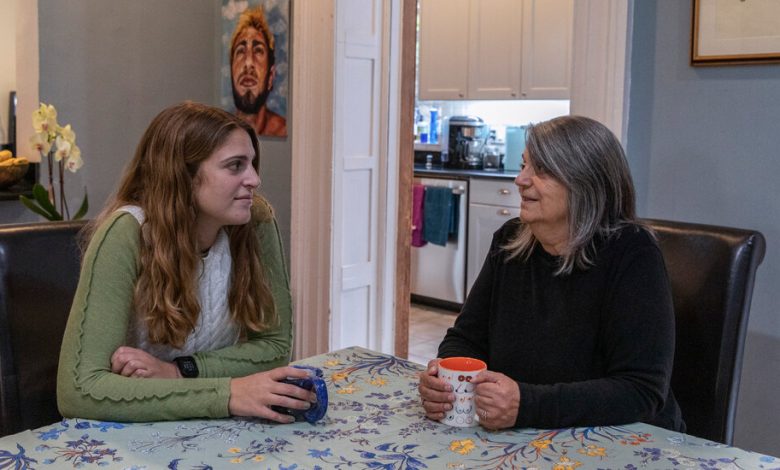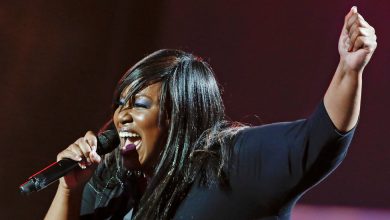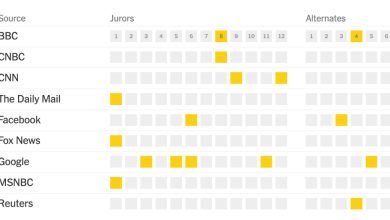With Israel at War, Thanksgiving Is Fraught for Some Jewish Families

There will be turkey at Marci Rosa’s family Thanksgiving in New Jersey, and stuffing and sweet potato and leek gratin. But also kasha varnishkes, a Jewish grain dish with roots in Eastern Europe, where her in-laws survived the Holocaust.
All across the country, families like Ms. Rosa’s are gathering on Thursday to nosh, to catch up and perhaps to bicker a little. But this year, with Israel at war and the world sharply divided over questions of justice, some Jewish families are finding that what it means to be a Jew is also on the Thanksgiving table.
Seated around one table will be members of a family whose stances toward Israel since the Hamas terrorist attacks on Oct. 7 and the Israeli military response have sent them to different ideological poles.
At one end is Ms. Rosa’s mother, Esther Rosa, 95, who recalls Thanksgivings during World War II with one seat left empty — her brother was fighting for the United States against the Germans — and is steadfast in her belief in Israel’s right to defend itself. At the other is her daughter, Becca Gertler, 25, who is outspoken in her support for the Palestinians, thousands of whom have been killed in the war. Somewhere in the middle is Ms. Rosa herself, a self-described liberal from Brooklyn who is in her 60s, and who regularly criticized Israel’s policies in the past, but now sees it — and Jews like her — as under threat.
Though the family is no stranger to heated debates, according to Ms. Rosa’s nephew, who is hosting the dinner, this kind of tension is new. “With my family, with politics we kind of know where those lines were drawn years ago; you know what to say if you want to press someone’s buttons,” said the nephew, who asked that his name not be used because of the contentiousness of the subject.
“You are going into a family dinner with a polarizing topic, not knowing where anybody stands,” he said. “I don’t think we’ve ever done that — I don’t think any family has ever done that.”
Raging family debates at Thanksgiving are as traditional as cranberry sauce. For generations, Americans have sat down to dinner divided over politics and taxes, Republicans and Democrats, the Giants and the Jets. At a time when things like protests against Israel’s policies and the tearing down of missing persons signs can feel like personal attacks, some American Jews are experiencing the revelation of differing values across the family Thanksgiving table with acute pain.
These types of identity- and values-based conflicts are the most intractable, according to Tricia S. Jones, a professor at Temple University and director of the Center for Conflict Management and Media Impact there. “They are so much a definition of who we are and need to be that it is very difficult for us to accept an alternate story from anyone — particularly from those we love,” she said.
Dr. Jones added: “You’ve got people who deeply love one another, and want to understand where their loved ones are coming from, so pretending away the differences and the pain also isn’t workable.”
There are 21 members of the extended Rosa family coming for Thanksgiving, but one matriarch will be absent: Judith Gertler, 89, Ms. Rosa’s mother-in-law, a Holocaust survivor who endured the Ravensbrück concentration camp in Germany as a little girl, and who lives in Brighton Beach, Brooklyn. She has dementia and is too frail to make the trip to New Jersey. With the support of Mrs. Gertler’s doctor, the family has kept all news of the Oct. 7 attack from her. She found refuge in Israel after the war, Ms. Rosa said, and the family was afraid the news would trigger post-traumatic stress.
There is some relief, too, Ms. Rosa said, that Mrs. Gertler will not be there to hear her granddaughter Becca’s strong criticism of Israel across the table. When Becca, a policy analyst, first shared her beliefs shortly after the attack, her mother was stunned. “I felt physical pain,” she said.
“She only sees one side of it,” Ms. Rosa said of their conversation about the war in Gaza, “and of course she would probably say that I see only one side of it.” Yet at the same time, she admires her daughter’s conviction. “It is important to be able to have your voice be heard, to speak up for the underdog, and to not accept things that you don’t believe in.”
At Thanksgiving dinner, Becca plans to speak her mind, she said, particularly because she feels it is important that her gaggle of younger cousins feasting on homemade bread rolls be exposed to different perspectives — not just from outsiders, but from fellow Jews.
“The weird part for me has been disagreeing with my parents” since the war began, she said in an interview. “On most things we are pretty aligned, but this is the first time where me and my mom have really gotten into arguments where we are not listening to each other.”
She added: “To me there are no sides. The sides are: not killing people.”
On Thursday morning, one of Ms. Rosa’s brothers will pick up their mother in Plainsboro, N.J., to bring her to Thanksgiving. She’s looking forward to the meal, she said, speaking through her daughter because she is hard of hearing.
This year, she said, calls to mind those Thanksgivings during World War II when her older brother was deployed abroad, and the importance of being together as Jews, and as family — no matter what is said over the meal. Then as now, Mrs. Rosa told her daughter, “Even though we knew what was happening over there, we still needed to celebrate over here.“



